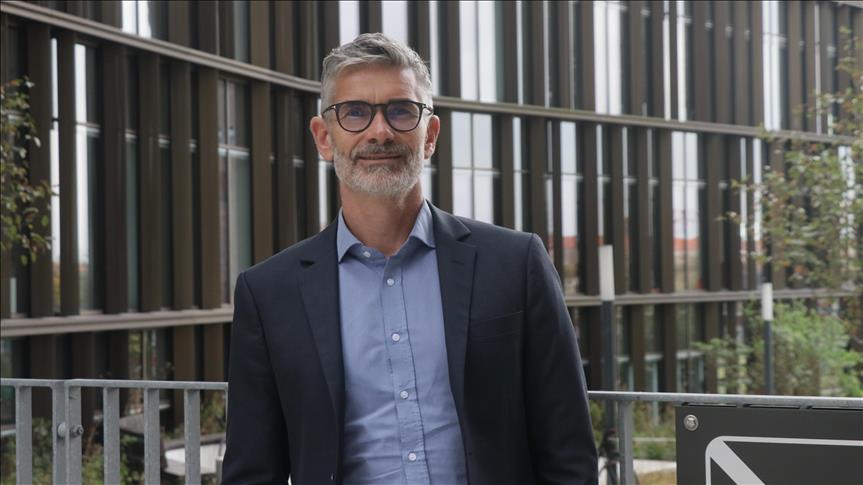Central heating and cooling expansion, as well as power market modeling to utilize large-scale renewable energy capacity in Türkiye is top of the agenda of the Strategic Sector Cooperation in Energy between Türkiye and Denmark, Ole Emmik Sorensen, the director of the Centre for Global Cooperation at the Danish Energy Agency (DEA) said Tuesday.
As part of BEST For Energy (Boosting Effective and Sustainable Transformation for Energy) Project implemented by Izmir Development Agency (IZKA) and the Energy Industrialist and Businessmen's Association (ENSIA), a study visit to Denmark revealed the journey that Denmark has taken in its energy transition.
Sorensen, in an exclusive interview with Anadolu Agency, said this transition started in the middle of the seventies energy crisis when Denmark was 99% dependent on imported fossil fuels, prompting a focus on energy efficiency and its own renewable energy resources.
Partnerships with the DEA, according to Sorensen, have allowed the organization to pass on the many technical and institutional lessons it has learned over the last 50 years to others who have come to the transition path later.
The aim of such partnerships is to decrease global emissions as much as possible.
Much help is needed is this regard because even if Denmark succeeds in becoming CO2-neutral tomorrow by cutting all emissions, it would only equate to a 0.1% reduction in global emissions.
'This is practically nothing. However, the 24 countries we work with emit 70% of the global emissions. So, if we can just accelerate their transition with five or ten years by telling them the best practices in Denmark, then we will have a lot of gain in the global greenhouse gas emissions scheme,' he said.
He believes that the current energy crisis will accelerate the energy transition even faster as power production from renewable sources is becoming cheaper by the day.
Denmark has become a world leader in terms of security of supply from its long history of renewable energy usage, which is now half the cost of fossil fuels, he said.
He further explained that the country has an energy security supply rating of 99.996%, correlating to an average outage of 10-20 minutes a year over the last ten years. This rate means that there is no electricity in the system for a mere 20 minutes a year in Denmark, which is the highest security of supply in the world.
- 25% of current heating systems in Türkiye could benefit from district heating
On the energy partnership with Türkiye, Sorensen said the two countries began their collaboration six years ago with a major focus on district heating, which is also a part of Denmark's energy efficiency scheme.
'In Denmark, 66% of households are currently heated by district heating. A large amount of that comes from renewable sources such as solar and wind, waste installation, and excess heat from industry,' he said.
Based on the comprehensive assessment carried out as part of Türkiye’s implementation of the EU’s Energy Efficiency Directive, around 25% of the current heating systems in Türkiye could be converted to district heating in the medium term in a cost-effective way, Sorensen said.
“The reason we work together here is to provide technical support in the preparation of the necessary legislative basis in Türkiye, based on Denmark's experience in climate solutions. We want to contribute to the formation of a well-functioning heat market in Türkiye by using the experience gained in Denmark,” he said.
On government-to-government cooperation, Sorensen said Türkiye and Denmark had also focused on offshore wind for about two years, culminating in a final roadmap that will be published before the end of the year, encompassing the correct balance in the system of onshore wind and solar PV.
“What we are commencing now is working on the planning and power sector modeling in order to secure the use of renewable energy potential in the best possible way,' he explained.
According to Sorensen, power sector modeling makes it possible to ascertain the best and cheapest pathway for future energy development in Türkiye.
Although Türkiye has an established power sector model and modeling team, the country could benefit from the experience in Denmark in introducing large-scale renewable energy to the grid system, he explained.
Denmark utilizes its more than 100% wind capacity, generating all the country’s power it needs on windy days, and on an annual basis, wind generates 50% of its consumption.
He concluded that pre-feasibility studies for district heating and cooling systems, as well as heat demand mapping using geographic information systems, the development of technical guidebooks for local governments, and power sector modeling, will continue as part of the Strategic Sector Cooperation Program carried out with the DEA on behalf of the Danish Ministry of Energy, Climate, and Public Services and the Turkish Ministry of Energy and Natural Resources.
By Ebru Sengul Cevrioglu in Copenhagen, Denmark
Anadolu Agency
energy@aa.com.tr


